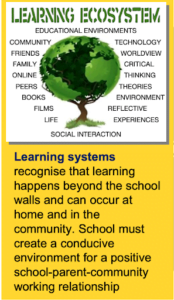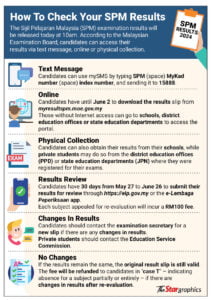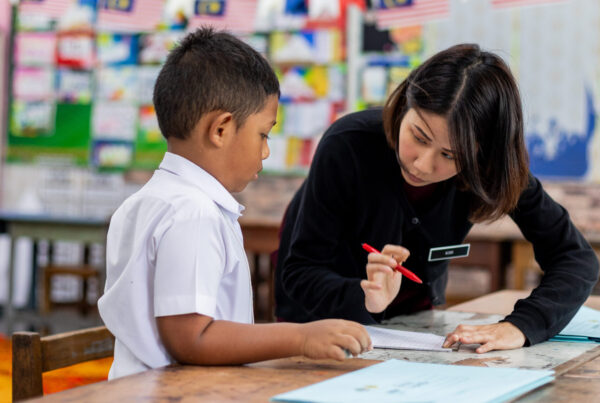Parental involvement in a child’s education significantly contributes to their academic success and overall development. This article outlines existing policies and research which emphasise the importance of parental involvement in the educational process.
What do Malaysian policy documents say about parental involvement in education?
The Malaysian Education Blueprint 2013-2025 is a comprehensive document developed by the Ministry of Education (MOE) based on extensive research and public engagement which outlines key strategies to transform Malaysia’s education system to achieve high-quality, equitable, and inclusive education.

Image source: Malaysian Education Blueprint 2013-2015, Ministry of Education Malaysia, 2013
One of the strategic and operational shifts identified to transform the system focuses on partnerships with parents and the wider community. As Malaysian students aged 7 to 17 spend about a quarter of their time in school, they are in other environments majority of the time. Therefore, the Blueprint highlights the need to shift perspectives from “school learning” to “system learning” by involving parents, the community, and the private sector as partners in supporting the education of our students.
This approach broadens the educational framework beyond the school walls and recognizes the role that various stakeholders play in the learning process to “create a learning ecosystem that reinforces the knowledge, skills, and values taught to students at school” (Ministry of Education Malaysia, 2013).
Given the critical role that parents play in a child’s learning and development, the Blueprint advocates for “shared responsibility between parents and teachers to ensure quality learning”. Active parental involvement to improve children’s educational outcomes is also highlighted in other policy documents such as the National Key Result Areas and the 12th Malaysian Plan.
Why is parental involvement important and what does it look like?

Photo by Ketut Subiyanto from Pexels.
The strong emphasis on parental involvement by the Ministry of Education in a child’s education is backed by research and aligned with international best practices and recommendations. The OECD (2023) reports that “parental involvement, both at home and at school, can translate into long-lasting benefits for children from early childhood through adult life”. Research has shown that parental involvement in children’s learning is strongly associated with children’s socio-emotional development, academic success, student engagement and motivation at school as well as high school completion.
Parental involvement can be defined as “the extent to which parents are involved in their child’s education at home and the amount of communication that they have with school” (Kamal et al., 2022). This can take many forms and remain beneficial to children’s learning regardless of the level of involvement. Past PISA (Programme for International Student Assessment) analyses have highlighted that parents do not need to have any specialised skills, knowledge or unlimited time to make an impact. Simple activities that involve a genuine interest and active engagement from parents are enough to make a meaningful difference. For example, students whose parents read to them in their early school years perform better at school regardless of the family’s socio-economic background. PISA findings also indicate that activities such as discussing books, films, or TV shows, talking about school progress, eating meals together, and spending time conversing with children are all linked to improved student reading performance (OECD, 2011).
While there are more detailed frameworks such as Epstein’s Six Types of Involvement or School-Family-Community Partnership Model to outline different types of parental involvement, we can broadly divide it into two main categories: home-based and school-based involvement.
Home-based parental involvement:
- Creating a Home Learning Environment: Setting up a conducive space for study and learning activities.
- Social Interaction: Engaging in conversations and activities that foster social development, having family meals together
- Communicating with Children: Regular discussions about their day, interests, and educational progress.
- Supporting Success: Providing motivation, guidance, and help with homework.
- Providing Facilities: Ensuring access to necessary educational resources and tools.
School-based parental involvement:
- Attending School Events: Participating in general school events such as report card days, sports days, and awards ceremonies.
- Parent-Teacher Meetings: Engaging in discussions about students’ progress and educational programs
- Volunteering: Assisting in school activities and helping other parents and teachers.
- Parent-Teacher Associations (PTAs): Being actively involved in PTAs/PIBG to influence decisions and school improvement strategies.
- Two-Way Communication: Maintaining regular communication with the school to stay informed about students’ progress.
What are some existing initiatives to increase parental involvement in Malaysia?

Image source from The Star.
One of the initiatives outlined in the Blueprint to promote parental involvement in education is to provide parents online access to monitor their child’s progress on school-based and national assessments through platforms such as the Sistem Analisis Peperiksaan Sekolah (SAPS). During the recent SPM results announcements, multiple methods were made available for candidates and parents to conveniently check the results, which is another step in the right direction.
Nevertheless, we need to continue increasing efforts to enhance transparency and communication between schools and parents so that it is more comprehensive. PISA 2022 findings report that only 20% of students’ parents receive monthly performance updates which is significantly lower than the OECD average of 60% (Schleicher, 2023). Therefore, more work needs to be done to include holistic and frequent progress reports and to enhance parent-teacher communication beyond the usual mid-year and end-year report card days.
Did you know that the Ministry has developed a Parent Engagement Toolkit to boost parental involvement in their child’s learning? The toolkit outlines the benefits of parental involvement, provides checklists for parents to self-assess their current level of involvement and a list of activities and initiatives that parents could do to support their children’s education and development. This toolkit was developed in conjunction with the Blueprint and was reported to have been rolled out to 10,000 schools between 2012 and 2013.

However, awareness and accessibility of the toolkit are still limited as it is not easily found online. A literature review conducted in 2022 on parental involvement in Malaysian education also suggests that researchers may be unaware of it, as it is not reflected in many of the articles reviewed. Additionally, the toolkit has not been updated or revised periodically with new information and research according to evolving needs. For example, when home-based learning became the norm during the COVID-19 pandemic, an updated parent toolkit to reflect the circumstances would have been a valuable resource. Socio-emotional aspects should also be given more attention in the toolkit as students who receive greater emotional support from parents are less likely to have skipped school and thus have better educational outcomes (OECD, 2019). Therefore, if a new parent toolkit is created as an initiative in the upcoming Blueprint, addressing these issues will make it a more comprehensive and useful source of information and support for parents.
To enhance school-based parental involvement, the Blueprint has also rightly noted the importance of strengthening the role of parent-teacher associations or Persatuan Ibu Bapa dan Guru (PIBG). One way is to expand the focus of these associations from fund-raising to developing parents and community-driven learning programmes. This is an area where more engagement and capacity building needs to be done so that PIBGs can play a bigger and more effective role in improving the educational experiences of students. Besides being informed about the school’s performance and activities, PIBGs should also serve as a platform for parents to provide input, and contribute to school improvement initiatives and activities. A strong parent-teacher partnership will ultimately drive better student outcomes and experiences.
While teachers and schools play a vital role, a child’s education begins and continues at home, making parents indispensable partners in the process. As the adage goes, “It takes a village to raise a child.” Our policies recognize this, and current efforts should be applauded. However, there is a need to strengthen the implementation and comprehensiveness of these initiatives while ensuring their sustainability. Additionally, assessing and reporting the impact of these initiatives will be crucial for continuous improvements and learning.
Note: In this article, parents and parental involvement may also refer to and include guardian(s).
References
- Kamal, S. S. L. A., Masnan, A. H., & Hashim, N. H. (2022). Parental Involvement in Young Children’s Education in Malaysia: A Systematic Literature Review. International Journal of Learning, Teaching and Educational Research, 21(3), 319–341.
- Ministry of Education Malaysia. (2013). Malaysian Education Blueprint 2013-2015. In www.moe.gov.my. Ministry of Education Malaysia.
- OECD. (2011). PISA in focus: What can parents do to help their children succeed in school? In PISA. Organization for Economic Cooperation and Development.
- OECD. (2023). Review Education Policies – Education GPS – OECD Parental involvement. OECD.
- Organisation for Economic Co-operation and Development. (2019). PISA 2018 Malaysia Country Note.
- Schleicher, A. (2023). Programme for International Student Assessment Insights and Interpretations PISA 2022.







One Comment